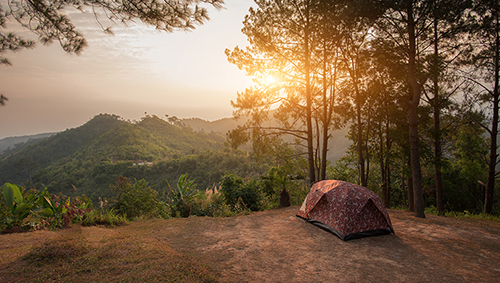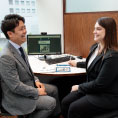英語記事に慣れる「サクっと読む英文」
2017.4.4
Camping on weekends can reset body clock
Read the article to find out how unnatural light can affect our sleep patterns.
人工的な光がどのように私たちの睡眠パターンに影響するのか、記事を読んでみましょう。

Kenneth Wright is a Professor at the University of Colorado in Boulder, USA. He carried out a number of studies about the human body clock and how light affects it. His most recent study was published in Current Biology in February, 2017. He found that when people are exposed to more natural light and less unnatural light, even if only for a short time, the body clock will start to reset itself.
The human body clock tells your body when it is time to sleep and when it’s time to wake up. It’s controlled by the hormone melatonin. In healthy sleepers, melatonin starts to rise a few hours before it’s time to go to bed, stays high during sleep, and falls just before it’s time to wake up. The period of time when melatonin is high is called “biological night”. Often, our alarm clocks go off during our biological night, meaning we find it very difficult to wake up. According to Professor Wright, this interruption of our biological night can lead to health problems like heart disease.
In the summer of 2013, Wright studied the length and time of biological night by sending some volunteers on a 6-day camping trip. Unnatural light was banned for the entire 6 days, which meant no phones, computers, or even torches. The only light allowed during the night was a fire. Over the course of the 6 days, the volunteers were exposed to 4 times more daylight than usual. By the end of the trip, the volunteers’ biological night started 2 hours earlier than it had during their normal day-to-day lives.
Wright carried out another similar study, but this time in winter. During this study, volunteers were exposed to 13 times more daylight than usual, despite the shorter daylight hours. As with the summer study, the volunteers’ biological night started earlier, but this time by 2.6 hours, rather than just 2 hours. This shows that our bodies are affected by different seasons.
Wright did a further study. This time, the volunteers only went on a 2-day camping trip. Even in this short time, the body clock started to reset itself. Melatonin levels started to rise an hour earlier than they did during the volunteers’ normal daily lives. “This tells us we can reset our clocks fast,” Wright said.
Unfortunately, the effects are not permanent, and the body clock will return to its previous rhythm once camping is over. However, you can help retain some of the effects, and therefore health benefits, if you spend more time in natural daylight each day, and reduce your exposure to unnatural light at night.
A recent study has shown that it is possible to reset your body clock in just 2 days. You can do this by going on a weekend camping trip with no unnatural light. Resetting your body clock can make it easier for you to wake up in the morning and not feel so tired.
Kenneth Wright is a Professor at the University of Colorado in Boulder, USA. He carried out a number of studies about the human body clock and how light can change it. His most recent study was published in Current Biology in February, 2017. He learned that the body clock will reset itself when people are exposed to more natural light and less unnatural light.
The human body clock tells your body when it is time to sleep and when it’s time to wake up. It’s controlled by the hormone melatonin. In healthy sleepers, levels of melatonin start to go up a few hours before it’s time to go to bed. It then stays high during sleep, and falls just before it’s time to wake up. The period of time when melatonin is high is called “biological night”. Often, our alarm clocks go off during our biological night. This means we find it very difficult to wake up. Wright says this interruption of our biological night can cause health problems.
In the summer of 2013, Wright studied the timing of biological night. He did this by sending some volunteers on a 6-day camping trip. The volunteers could not use any unnatural light for the whole 6 days. This meant no phones or computers. The only light they could use during the night was a fire. During the 6-day trip, the volunteers were exposed to 4 times more daylight than usual. By the end of the trip, the volunteers’ biological night started 2 hours earlier than it had during their normal day-to-day lives.
Wright carried out another similar study, but this time in winter. During this 6-day camping trip, volunteers were exposed to 13 times more daylight than usual. This happened even though daylight hours were shorter. As with the summer study, the volunteers’ biological night started earlier. However, on this trip, it started 2.6 hours earlier, rather than just 2 hours earlier. This shows that different seasons change how our bodies work.
Wright did a further study. This time, the volunteers only went on a 2-day camping trip. Even in this short time, the body clock started to reset itself. Melatonin levels started to go up an hour earlier than they did during the volunteers’ normal daily lives. “This tells us we can reset our clocks fast,” Wright said.
Sadly, the body clock will return to its old pattern once camping is over. However, you can still enjoy some of the health benefits. Just spend more time in daylight each day, and less time in unnatural light at night.
キーフレーズ
go on a trip 旅行に行く
“go on a trip” は、旅行する、旅行に出かけるという意味です。”trip” の前に ”business” や ”day” などを置くことで、どんな旅行なのかを説明することができます。(”go on a business trip”「出張に行く」、”go on a day trip”「日帰り旅行に行く」)
文中では「週末のキャンプ旅行に行く」と言っています。
例:I have to go on a business trip next month.”
(来月出張に行かなければならない。)
exposure さらされて(露出して)いること
be exposed to ~ ~にさらされる
日光・風雨などの自然環境にさらされるという意味です。また、人前や社会などに出る・さらされるという意味や、”be exposed to English” のように言語や文化に(人を)触れさせる・経験させるという意味でも使われます。
通常は避けることができない、または努力を必要としない状況で使われます。記事中ではキャンプ中に自然光を浴びることについて話しており、特に努力をしなくても外にいれば自動的に自然の光に体がさらされるという意味で使われています。
例:I was exposed to French while I was traveling in France.
(フランスに旅行中にフランス語に触れた。)
period 期間
biological night 生物学上の夜(眠気をもたらす作用のあるメラトニンの分泌量が高くなる時間帯)
go off (アラームなどが)鳴りだす
アラームや警報装置などが突然鳴り出す・作動するという意味です。
例:The smoke from the burned toast made the fire alarm go off.
(焦げたトーストから出た煙で火災報知機が鳴った。)
be banned 禁止される
day-to-day 毎日の
as with ~ ~と同様に
あるものの状態や状況が他のものと似ているときに使われる表現です。
例:In Tokyo, as with other big cities, parking is a major problem.
(東京では、他の大都市と同じように、駐車が大きな課題となっている。)


 【Gabaからのお知らせ】
【Gabaからのお知らせ】 【特集】
【特集】 【英単語の正しい使い分け】
【英単語の正しい使い分け】 【使いこなす句動詞】
【使いこなす句動詞】